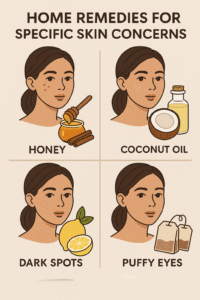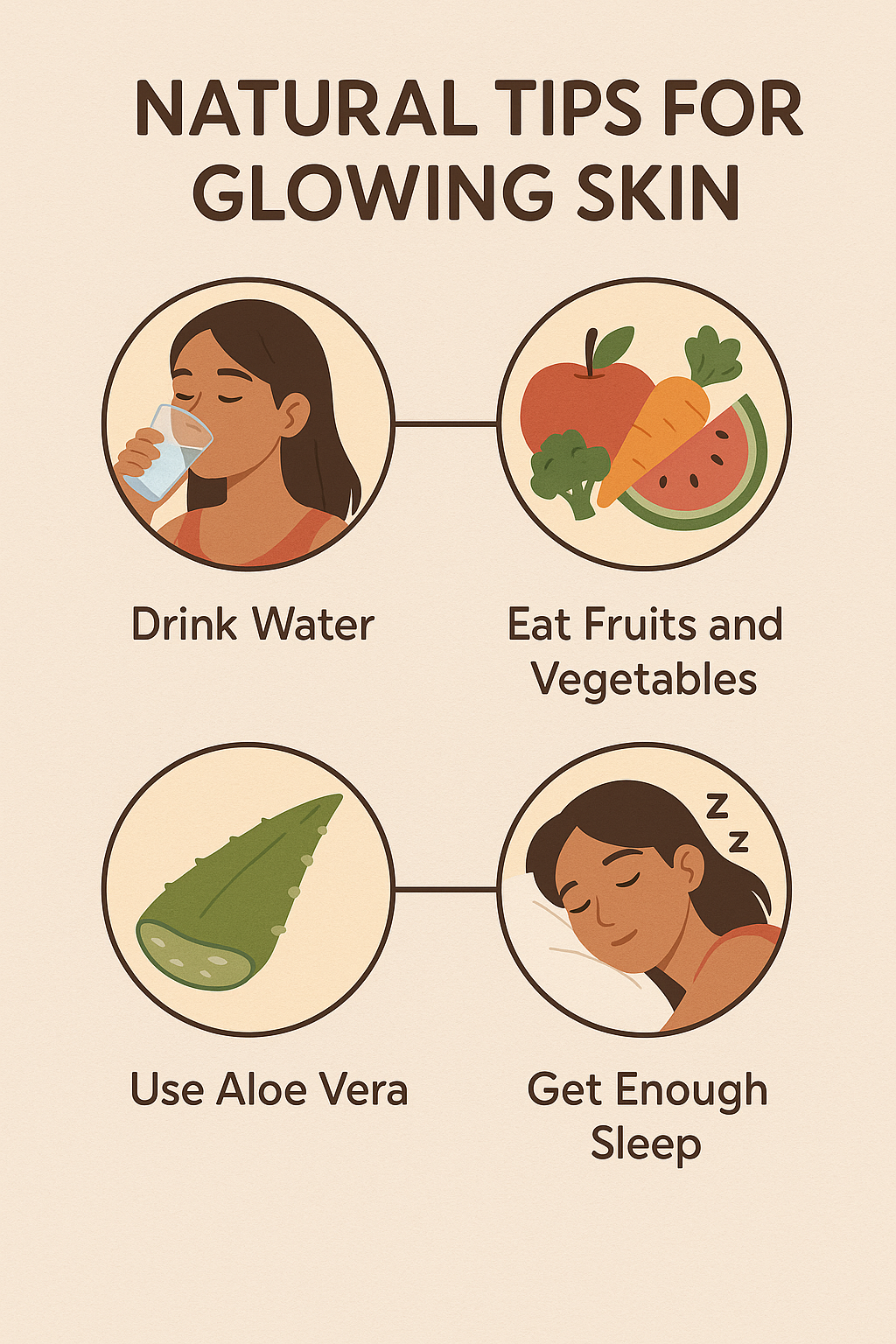Natural tips for glowing skin
Everyone dreams of having radiant, glowing skin. While countless beauty products promise miracles, achieving a natural glow doesn’t always require expensive treatments or chemical-based products. Often, the best remedies for glowing skin are found right at home, using ingredients from your kitchen and adopting healthy habits.
we’ll dive into proven natural tips that can transform your skin naturally and sustainably. Whether you have dry, oily, or sensitive skin, these home remedies and lifestyle tweaks will help you shine from within.
Why Is Natural Skin Care Important?
No Harsh Chemicals: Natural ingredients minimize the risk of irritation and allergies.
Sustainability: Home remedies are often eco-friendly and biodegradable.
Cost-effective: Many natural skincare options are already in your pantry.
Holistic Healing: Natural tips not only benefit your skin but your overall health too.
Essential Natural Tips for Glowing Skin
1. Stay Hydrated: Water Is Your Best Friend
Why it matters:
Hydration is key to flushing out toxins and keeping your skin plump and fresh.
Tips:
Aim for 8-10 glasses of water daily.
Include hydrating foods like cucumber, watermelon, and oranges.
Drink coconut water for an added electrolyte boost.
2. Follow a Clean Diet: Glow from Within
Why it matters:
Your skin reflects what you eat. A nutrient-rich diet promotes elasticity, clarity, and glow.
Foods for glowing skin:
Vitamin C-rich foods: Oranges, strawberries, broccoli.
Omega-3 fatty acids: Walnuts, flaxseeds, chia seeds.
Antioxidant-rich foods: Blueberries, spinach, green tea.
Tip: Avoid too much sugar and processed foods to prevent dullness and breakouts.
3. Cleansing: Keep Your Skin Fresh and Dirt-free
DIY Natural Cleansers:
Honey Cleanser: Mix 1 tsp raw honey with a few drops of water. Massage on face and rinse.
Milk Cleanser: Dip a cotton ball in raw milk and gently wipe your face.
Why honey? It’s antibacterial, moisturizing, and packed with antioxidants.
4. Exfoliate Gently at Home
Why exfoliate?
It removes dead skin cells, promotes blood circulation, and reveals a fresher layer of skin.
Natural exfoliators:
Oatmeal scrub: Mix 2 tbsp oatmeal with yogurt and a dash of honey. Scrub gently.
Sugar scrub: Blend sugar with olive oil or coconut oil for a gentle exfoliant.
Tip: Exfoliate only 1-2 times a week to avoid damaging your skin.
5. Moisturize Naturally
Even oily skin needs moisture! Keeping skin hydrated helps maintain its natural balance.
Natural moisturizers:
Aloe Vera Gel: Soothes, hydrates, and fights acne.
Coconut Oil: Rich in fatty acids; perfect for dry skin.
Jojoba Oil: Closest to the skin’s natural oils, great for all skin types.
6. Face Masks You Can Make at Home
a) Turmeric and Yogurt Mask
1 tsp turmeric
2 tbsp yogurt
Mix and apply for 15 minutes.
Benefits: Brightens skin, reduces blemishes, fights bacteria.
b) Avocado and Honey Mask
½ ripe avocado
1 tbsp honey
Mash together and apply for 20 minutes.
Benefits: Deep hydration and nourishment.
c) Papaya and Lemon Mask
3 tbsp mashed papaya
A few drops of lemon juice
Apply for 15 minutes.
Benefits: Natural exfoliation and brightening effect. Natural tips for glowing skin
7. Facial Massage: Boost Circulation
Benefits of facial massage:
Stimulates blood flow
Enhances product absorption
Relieves tension
DIY technique:
Use gentle upward strokes with your fingertips.
Apply a few drops of oil for a smoother glide.
Do this for 5-10 minutes before bedtime!
8. Get Your Beauty Sleep
Why it matters:
During sleep, your body repairs damaged cells and builds new ones.
Tips for better sleep:
Maintain a regular sleep schedule.
Use a silk pillowcase to reduce skin friction.
Keep your bedroom cool and dark.
Aim for at least 7-8 hours of uninterrupted sleep every night.
9. Stay Active: Exercise for Glowing Skin
Benefits of exercise:
Increases blood flow
Reduces stress (a major cause of skin issues)
Promotes detoxification through sweat
Tip: Don’t forget to cleanse your face after working out to remove sweat and dirt.
10. Practice Stress Management
Chronic stress leads to hormonal imbalances that can appear as acne, dullness, or rashes.
Natural stress-busters:
Meditation and deep breathing exercises
Journaling
Spending time in nature
Aromatherapy (lavender oil, chamomile tea)
A calm mind truly brings out your natural glow.
11. Protect Your Skin from the Sun
A natural skin glow is impossible without sun protection.
Natural sun protection tips:
Wear a wide-brimmed hat and sunglasses.
Apply natural sunscreen (zinc oxide-based) even indoors.
Seek shade during peak hours (10 AM – 4 PM).
12. Use Natural Toners
Best natural toners:
Rose Water: Balances skin pH, hydrates.
Cucumber Water: Soothes and cools the skin.
Spritz some chilled rose water on your face for an instant refresh!
13. Home Remedies for Specific Skin Concerns

Acne:
Dab diluted tea tree oil directly onto pimples.
Hyperpigmentation:
Apply potato juice or aloe vera gel regularly.
Dry patches:
Use a mashed banana mask for hydration.
Under-eye circles:
Place chilled green tea bags over your eyes for 10-15 minutes.
14. Keep Your Skin Routine Simple
Less is more. Stick to a basic but consistent routine:
Cleanse
Moisturize
Protect (SPF)
Add treatments or masks only when necessary.
15. Consistency Is Key
Natural remedies take time, but they offer lasting results.
Stick with your routine, stay patient, and celebrate small wins like improved texture or fewer breakouts.
Conclusion
Achieving glowing skin naturally at home isn’t a quick fix—it’s a lifestyle.
With patience, consistent habits, and a little love, your skin can become healthier, softer, and more radiant. Remember, beauty starts from within, so nourish your body, mind, and skin together.
Start your natural skincare journey today — your future glowing self will thank you!
FAQs: Natural Skincare Tips
Q1: How long does it take to see results with natural remedies?
Natural skincare often requires consistency. Expect to see visible improvements within 4-6 weeks with regular care.
Q2: Can I use lemon juice directly on my skin?
While lemon juice has brightening properties, it’s highly acidic and can irritate sensitive skin. Always dilute it with water or mix it into masks.
Q3: Is coconut oil good for acne-prone skin?
Coconut oil can clog pores for some people. If you have oily or acne-prone skin, lighter oils like jojoba or rosehip oil are better choices.
Q4: What’s the best time to apply a homemade face mask?
Evening is ideal because your skin repairs itself overnight, and you’re less exposed to pollutants after applying a mask.
Q5: Can diet alone improve my skin?
Diet plays a crucial role, but needs to be combined with good skincare habits, stress management, and sun protection for the best results.
Q6: How often should I exfoliate?
Exfoliate gently 1-2 times a week. Over-exfoliating can strip the skin’s natural oils and cause sensitivity.
Q7: Are homemade scrubs safe?
Yes, when made with gentle ingredients like oats, sugar, or coffee grounds. Always massage lightly to avoid damaging your skin.

